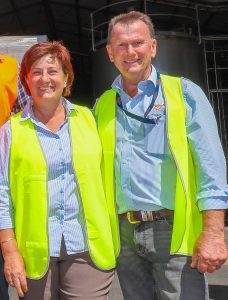11 March 2020
Citrus Value Chain Innovators Award: Nippy’s
Citrus Value Chain Innovators Award: Nippy’s
11 March 2020
The installation of an AsepTec linear filler in 2018 has allowed the family-owned Nippy’s at Moorook, South Australia, to produce long-life juices that closely mirror fresh juice in both flavour and appearance.
In a game-changing decision, these varieties – orange, cloudy apple, blood orange and pink grapefruit – now have a potential shelf-life of at least a year and can be exported and placed in the chilled section alongside fresh juices.
Now in its 52nd year of manufacturing, Nippy’s has been processing long-life juice and flavoured milk since the mid-1980s.
Its history as a producer of fruit stretches back even further: to the 1930s, when Alic Knispel started growing and packing citrus in the Riverland. With about 300ha of orchard the Knispels currently provide 20-25 per cent of their own juicing requirements.
In recent decades Nippys has been producing long-life juice in a one-litre pack called Combibloc – a flexible foil-paper packaging.
Their market in Japan was buying this product for the food-service sector but not doing particularly well with it.
The machinery in the Nippy’s factory was becoming quite old so the company had to consider either buying the next generation of filling machine or maybe deleting the product.
They needed to rethink what they were doing with long-life processing of fruit juice and where they were going to market it.
In the end Jeff and the team decided that rather than simply replace like with like they would invest in a major upgrade.
Their research showed that a plastic bottle would be the favoured container for this type of product for the next few years.
They decided if they could find a PET filler that would not only produce a long-life product but also do more than one sized packaging, they could explore possibilities other than just the one-litre market.
The Knispels’ new equipment fills a sterile pack with a sterile produce within a sterile environment.
The bottle itself also has certain barrier properties, which means that a premium not-from-concentrate juice can have a significantly longer shelf-life while keeping the transparent PET bottle with a single-stage, tamper-evident cap that consumers are accustomed to seeing for fresh juice.
In the case of Nippy’s, breaking with tradition by introducing a new container type was the impetus for elevating the product into a higher value category.
Because they were starting something new, Nippy’s asked their customers in Japan to treat it as a cool-chain product.
It’s cold-pressed from chilled fruit and cold-filled. Nippy’s sea-freight it refrigerated and their Japanese customers warehouse it refrigerated.
It goes into refrigeration in the retail outlets – the dairy cabinet as opposed to the dry grocery aisles.
Not only does this preserve the fresh flavour and appearance of the product but it also creates a perception with consumers that if it’s with the yoghurts, cheeses and milk it must be a fresh product, too.
While Nippy’s could confidently assign all four juices a shelf life of at least 12 months it prefers to specify only half of that to encourage repeat sales and ensure the product is consumed before any slight deterioration in quality occurs.
They are selling a one-litre and also a 300-millilitre single serve that’s already in 7-Elevens in Japan and sales continue to grow strongly, as their decision to look outside the square has been rewarded.

Tina and Jeff Knispel of Nippy’s.
Membership
You are not logged in
If you are not already a member, please show your support and join Citrus Australia today. Collectively we can make big things happen.
